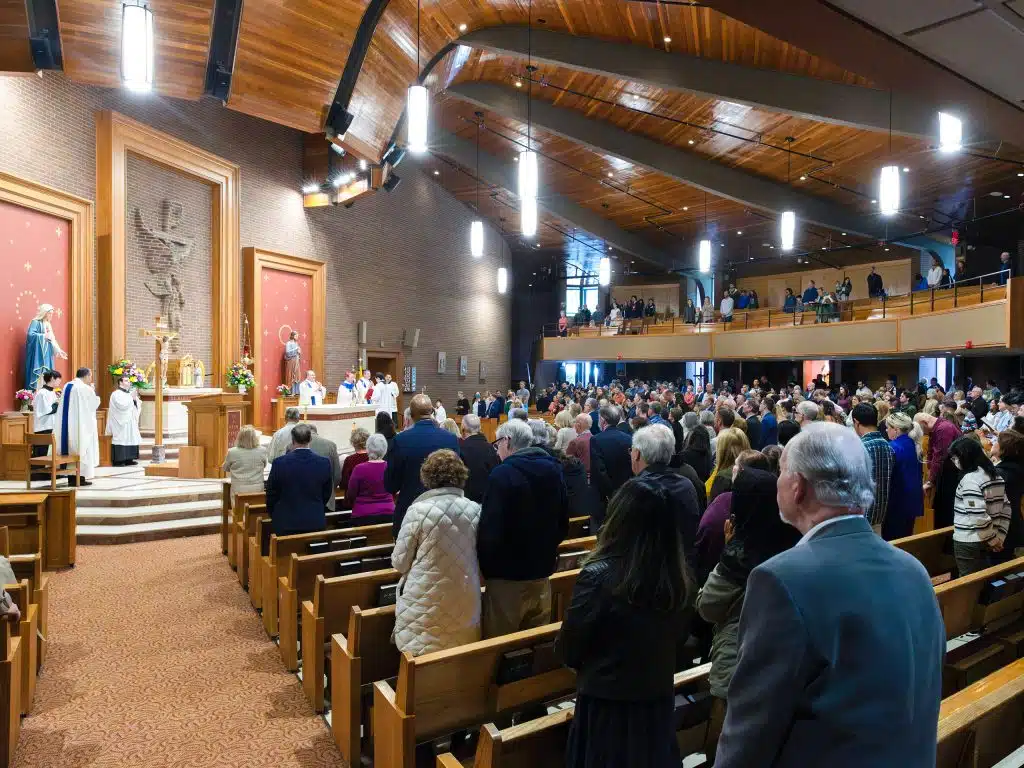Q. Many years ago, I had an abortion. After many years as a lapsed Catholic, I returned to the Church and to confession. The abortion sin was confessed to a chaplain while I was in the hospital. Although he said something about abortion carrying with it an excommunication, he gave me absolution. I gave it no additional thought and continued to receive the sacraments (Communion, Reconciliation, and even remarriage within the Church.) It wasn?t until recently that I read something about the “rite” of removing an excommunication that I began to fear I had done and continue to do something wrong. Can you help by setting my mind at ease or instructing me in the way to proceed? ? An ACH Reader
Since abortion is the purposeful murder of an innocent, unborn child, the Church indeed imposes the most severe penalty of excommunication for this heinous action. A person who successfully procures an abortion receives this penalty automatically (Code of Canon Law, #1398). Unlike some offenses that require the competent authority to impose the penalty of excommunication (technically termed ferendae sententiae), the penalty here is automatic (technically termed latae sententia).
Please note that this penalty is not just imposed upon the woman who has the abortion. Any Catholic accomplice in the act of procuring an abortion, even though not specifically mentioned in Canon #1398, receives the same penalty of automatic excommunication. Here an accomplice is one who assists in such a way that the heinous act would not have been committed without his assistance. Therefore, the doctor who performs the abortion, the nurse who assists in the procedure, the boyfriend who encourages the abortion, and the parent who pays for the abortion ? all are accomplices, guilty of the act, and thereby receive the just penalty. (See Code of Canon Law, #1329.2.)
Always remember that the severe penalty of excommunication exists first to prevent a heinous sin from occurring (i.e. moving a person to rethink performing an action in light of the penalty that will be imposed), and second to move a person to repentance and reconciliation. Also, for a person to be automatically excommunicated, he must know that the penalty exists and will be imposed for a particular offense, and then choose to perform the action with full knowledge and freedom.
Nevertheless, the door to reconciliation remains open to the repentant sinner. The diocesan bishop has authority to remit the automatic excommunication imposed for an abortion. Such remission would occur in the Sacrament of Penance. The bishop in turn may delegate this authority to priest confessors. Accordingly, in the Priests? Faculties and Permissions promulgated by Bishop Keating (and still in effect despite his death), each priest in the Diocese of Arlington has the authority within the context of the Sacrament of Penance to remit the automatic excommunication and to grant absolution the first time a person confesses having procured or assisted with procuring an abortion. However, in those cases when a person has already confessed on a previous occasion for having procured or assisted with procuring an abortion but then has repeated the offense, the priest confessor must contact the Bishop who will provide a just penance. The priest confessor would then meet with the penitent, impose the penance, and grant absolution. (If the priest confessor judges that it would be too burdensome for the penitent to remain in the state of mortal sin until the Bishop acts, the Code of CanonLaw stipulates that a priest confessor can remit an automatic excommunication and later inform the Bishop of the circumstances (#1357.1) )
In all, the Church strives not only to uphold the truth about the sanctity of life and to prevent a person from committing such a heinous sin, but also to reconcile the sinner and to be the instrument of the Lord?s compassion and mercy. Turning specifically to the reader in the question, I offer the following guidance: You seem to have followed the proper procedures and to have been properly reconciled to the Lord and the Church. Thank God for the grace which moved you to reconciliation. Look now for those graced opportunities when you can intervene and help someone else who may be considering having an abortion or may have had an abortion. If you continue to have any questions about this issue, please contact your parish priest.



